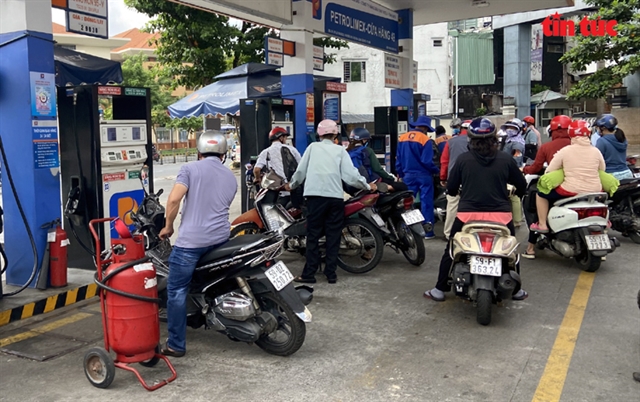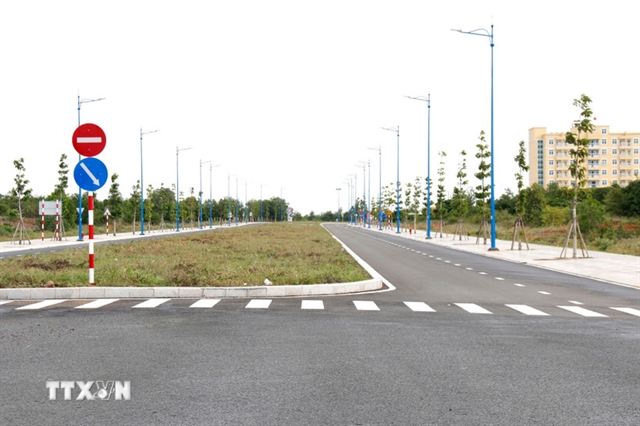 Economy
Economy

 |
| Farmers feed 'tra' fish in An Giang Province. With tariff liberalisation, the UKVFTA gives Vietnamese seafood products greater competitive advantage over other markets such as India, Indonesia and Thailand. — VNA/VNS Photo Công Mạo |
Việt Nam should focus on improving quality and building brands for fishery products to take advantage of the UK-Việt Nam Free Trade Agreement (UKVFTA) for further expansion to this market.
According to Nguyễn Hoài Nam, deputy general secretary of the Việt Nam Association of Seafood Exporters and Producers (VASEP), the fishery sector is one which can benefit the most from the UKVFTA.
The tariffs on shrimp and tra fish have been lifted completely since the UKVFTA came into force. Shrimp and tra fish are currently the two major export fish products of Việt Nam to the UK, accounting for 70 per cent and 20 per cent, respectively, of Việt Nam’s total exports, worth around US$300-350 million to this market every year, or four per cent of the country’s total global exports.
“These are, indeed, impressive figures," Nam said.
"If we look at the UK as a single market, the UK is the sixth largest market for Vietnamese fishery products. Although the UK has not yet entered the billion-US-dollar club, fish exports to this market saw growth of around eight per cent in the first nine months of this year over the same period last year.
“It is the advantage the UKVFTA has given to Vietnamese products that promotes the growth of exports to the UK despite the impacts of the COVID-19 pandemic or geopolitical conflicts around the world.”
In light of the UKVFTA, Vietnamese seafood products have greater competitive advantages over other markets such as India, Indonesia and Thailand which have not signed FTAs with the UK, according to Nam.
However, to better take advantage of the tariff incentives from the UKVFTA, it is necessary for Vietnamese producers and exporters to focus on improving quality and supplying capacity in order to expand market share in the UK.
"The UK has requirements about food hygiene and safety, origin traceability, corporate social responsibility and sustainability, which are basically the same before Brexit," Nam said, adding that this is also an advantage of domestic exporters with experience working with the EU partners.
He urged seafood producers and exporters to regularly update the market information, especially changes in requirements such as illegal, unreported and unregulated (IUU) fishing, to maintain export momentum.
Companies could study the UK market information via the UK and Vietnamese governments’ official sources, the UK public body Seafish and e-portal of VASEP.
Nam said that owning market information would play an important role in the success of the shrimp export market, for example, to the UK. Currently, Việt Nam’s shrimp export to the UK accounts for more than 60 per cent.
“The opportunities are even bigger for the export of Vietnamese products to the UK, given the UK’s accession to the Comprehensive and Progressive Agreement for Trans-Pacific Partnership (CPTPP),” Nam said.
He said the drastic efforts taken by Việt Nam recently to reduce emissions, apply organic production, promote the use of renewable energy and protect the environment, had helped Vietnamese products gain trust and favour by the British consumers who prioritise traceability, food safety, environmentally friendliness, and ethical standards.
However, Việt Nam must ramp up the effort to get IUU 'yellow card' removed. Deputy Prime Minister Trần Hồng Hà recently stressed that the removal of the card was critical, not only to expand exports but also to develop the sustainable fishing industry, ensure long-term benefits and livelihoods.
Nam said that enterprises needed the Government’s support to have higher competitiveness to be able to effectively exploit FTAs, including the UKVFTA, for export expansion.
Vũ Việt Thành from the European-American Market Department under the Ministry of Industry and Trade, said Vietnamese producers and exporters should tighten control over the entire production process to ensure origin traceability, quality, food hygiene and safety, as well as increase the application of science and technology for deep processing to increase the competitiveness of products.
Focus on brand building
 |
| Shrimp processed for export. Improving competitiveness through building brand, improving quality, ensuring food hygiene and traceability is critical for sustainable export to the UK. VNA/VNS Photo Hồng Đạt |
The fishing sector should focus on developing brands to better take advantage of opportunities arising from FTAs.
Việt Nam has signed and basically concluded negotiations on 17 FTAs, with over 60 countries and territories.
"FTAs have positively changed the entire fishery sector through the effort of complying with the regulations on conservation and protection of diverse ecosystem, rational exploitation and use of aquatic resource and sustainable aquaculture," said Nguyễn Thị Phương Dung from the Directorate of Fisheries under the Ministry of Agriculture and Rural Development.
"The sector has been focusing on enhancing management capacity across the entire value chain, improving product quality and ensuring traceability.
"The participation in new-generation FTAs also creates an impetus to accelerate the modernisation of the fish sector and promote the application of advanced technologies and investment in closed production chains."
VASEP said that Việt Nam’s fish products had been exported to more than 160 markets, the major ones being those the country has FTAs with.
Specifically, export to CPTPP markets accounts for 25 per cent of Việt Nam’s total fish exports, to the EU with EU-Việt Nam FTA (EVFTA) 10 per cent and South Korea with the Việt Nam-Korea FTA (VKFTA) 9 per cent and the UK with the UKVFTA around 4 per cent.
To better use FTAs, Nam said it was vital to focus on building and developing brands, adding that branding is associated with the decisions of retailers and consumers to make purchases or not.
“Building a brand cannot be done in a day or two, but it is a process requiring the coordination of the Government, ministries, localities, business community and farmers,” he said.
With regard to the Ministry of Industry and Trade’s plan of developing an FTA ecosystem, Nam expected that the ecosystem would help producers and exporters to better take advantage of opportunities from FTAs to expand exports sustainably.
VASEP also urged enterprises to enhance competitiveness through improving product quality and diversifying export markets.
Fish exports are poised to hit $10 billion this year, on improving demand of major import markets including the US and China, up from $9.2 billion last year, according to the Ministry of Agriculture and Rural Development.
Exports totalled $8.33 billion in the first 10 months of this year, up 12 per cent over the same period last year. Shrimp exports were estimated at $3.23 billion, up 13.9 per cent, and tra fish $1.54 billion, up 8.7 per cent.
In October alone, seafood exports reached $1.1 billion, up 31 per cent, returning to the threshold of $1 billion after 27 months.
The US, China and Japan are the three largest export markets for Vietnamese seafood products, accounting for 18.5 per cent, 16.8 per cent and 15.4 per cent, respectively. VNS




